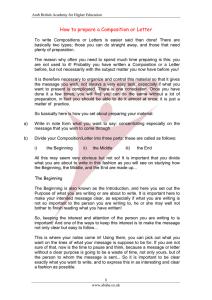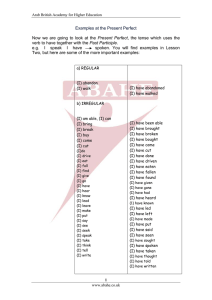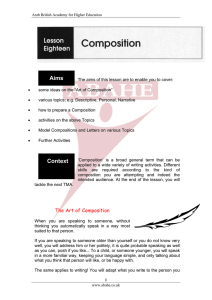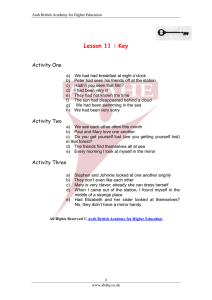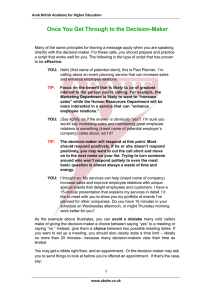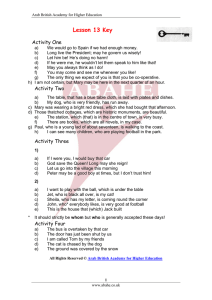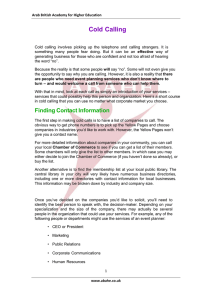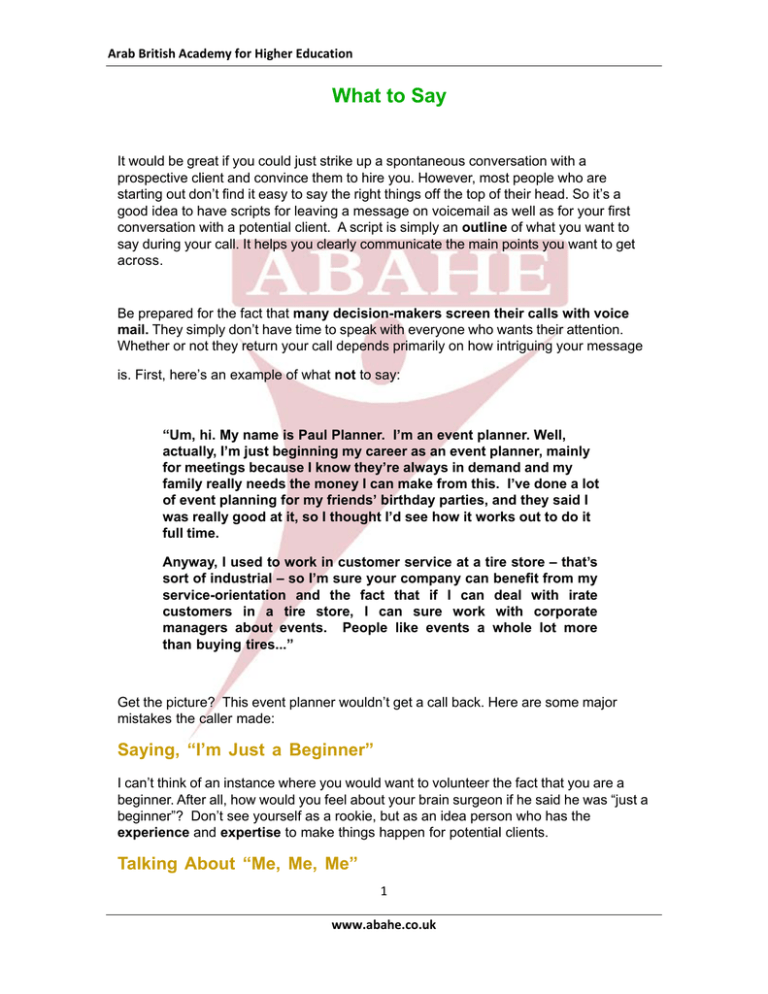
Arab British Academy for Higher Education What to Say
It would be great if you could just strike up a spontaneous conversation with a
prospective client and convince them to hire you. However, most people who are
starting out don’t find it easy to say the right things off the top of their head. So it’s a
good idea to have scripts for leaving a message on voicemail as well as for your first
conversation with a potential client. A script is simply an outline of what you want to
say during your call. It helps you clearly communicate the main points you want to get
across.
Be prepared for the fact that many decision-makers screen their calls with voice
mail. They simply don’t have time to speak with everyone who wants their attention.
Whether or not they return your call depends primarily on how intriguing your message
is. First, here’s an example of what not to say:
“Um, hi. My name is Paul Planner. I’m an event planner. Well,
actually, I’m just beginning my career as an event planner, mainly
for meetings because I know they’re always in demand and my
family really needs the money I can make from this. I’ve done a lot
of event planning for my friends’ birthday parties, and they said I
was really good at it, so I thought I’d see how it works out to do it
full time.
Anyway, I used to work in customer service at a tire store – that’s
sort of industrial – so I’m sure your company can benefit from my
service-orientation and the fact that if I can deal with irate
customers in a tire store, I can sure work with corporate
managers about events. People like events a whole lot more
than buying tires...”
Get the picture? This event planner wouldn’t get a call back. Here are some major
mistakes the caller made:
Saying, “I’m Just a Beginner”
I can’t think of an instance where you would want to volunteer the fact that you are a
beginner. After all, how would you feel about your brain surgeon if he said he was “just a
beginner”? Don’t see yourself as a rookie, but as an idea person who has the
experience and expertise to make things happen for potential clients.
Talking About “Me, Me, Me”
1 www.abahe.co.uk Arab British Academy for Higher Education Notice how many times the first caller said “I” or “me.” Potential clients, like most other
humans, are more interested in their own needs than hearing “me-focused” comments
like these.
Burdening Your Potential Client With Your Survival
“My family really needs the money I can make from this” is not an appropriate thing to
say to a prospective client. You don’t want pity. You want to run a business. You want to
serve clients. Tell them what you can do for them, not what you want them to do for you.
See yourself as a businessperson exploring whether doing business with this company
would be beneficial for both of you.
Communicate your message with confidence. Assume that what you offer is something the decision-maker wants. Assume you can do, with excellence, anything your
clients want. Your call is much more likely to be returned if that can-do attitude infects
every contact you make with every potential client on the planet.
Instead, here’s a much better approach, which can be modified to suit whatever your
own specialization is.
“Hello (first name of potential client), this is Paul Planner. I help
companies plan unique special events that delight employees and
customers. Please give me a call at 555-1234 so we can discuss how
this service would benefit your company.”
If your call is intriguing and the company needs event planning services or is looking to
improve its customer or employee relationships – as many companies are – your call is
likely to get returned. However, there is no way to get appointments with every single
person you call, not even if you are Julia Roberts. (Well, unless you say you’re from the
IRS and have a “serious matter” to discuss.)
But failing either of those two things, just be polite and move on if you don’t get the
response you’re seeking. Remember, there is a buyer for every product and service.
And you are offering something of value.
How Often Should You Call?
I have heard a few decision-makers say that persistence pays off. In other words,
someone who calls repeatedly will eventually get their call returned. However, they are
probably the exception to the rule. Most decision-makers say someone who pesters
2 www.abahe.co.uk Arab British Academy for Higher Education them turns them off. One woman told us she makes a mental note of the people who
call repeatedly and resolves never to have anything to do with them.
Calling without leaving a message may seem like a good idea, but many business people
have caller ID on their telephone. If they see a dozen calls from someone who doesn’t
leave a message, they are likely to assume the caller is selling something they would not
be interested in. Not only will the decision-maker not pick up the phone, but also they may
become so irritated with the calls that they may respond negatively when the caller finally
does leave a message.
3 www.abahe.co.uk Arab British Academy for Higher Education If your first call is not returned, I recommend calling a second time a few days later,
just in case your first message didn’t get through. Messages are rarely erased
accidentally, but you wouldn’t want to miss a business opportunity if, for some
reason, it happened to your call. If neither of your calls is returned, it may be wise to
wait awhile before calling again or focus instead on prospective clients who are
interested in working with you.
TIP:
You are much more likely to get your call returned if you
say you were referred by someone the decision-maker
knows and respects. Ask for referrals after all your talks
and slip “______ suggested I call you” into the script
after your name.
All Rights Reserved © Arab British Academy for Higher Education 4 www.abahe.co.uk


